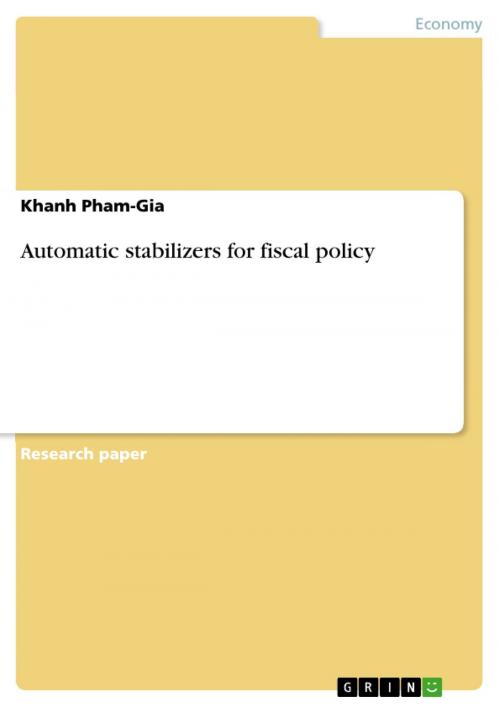Automatic stabilizers for fiscal policy
Nonfiction, Social & Cultural Studies, Political Science, Politics, Economic Policy| Author: | Khanh Pham-Gia | ISBN: | 9783640381265 |
| Publisher: | GRIN Publishing | Publication: | July 22, 2009 |
| Imprint: | GRIN Publishing | Language: | English |
| Author: | Khanh Pham-Gia |
| ISBN: | 9783640381265 |
| Publisher: | GRIN Publishing |
| Publication: | July 22, 2009 |
| Imprint: | GRIN Publishing |
| Language: | English |
Research Paper (undergraduate) from the year 2008 in the subject Business economics - Economic Policy, grade: 1.0, University of applied sciences, Munich, language: English, abstract: The object of this study is to analyze the influence of fiscal policy, in particular of the public expenditure, on the stabilization of business cycle. Moreover, the functional principle of automatic stabilizers and the impact of fiscal stabilizers on businesses are studied. The condition for a steady economic development is achievement of stability targets like full employment of production factors, monetary stability, balancing of payment as well as equilibrium of foreign trade. To counteract the economic fluctuations government can apply two stability tools: the fiscal and the monetary policy. These both policies affect the aggregate demand and contribute to stabilize short-run economic fluctuations. The principle of the fiscal policy is an adjustment of public expenditure and public revenue (taxes) in according to the economic situation. A higher public expenditure leads to an increasing of the aggregate demand. The total change in GDP is depending on two opposite macroeconomic effects: the multiplier and the crowding-out effect. The multiplier effect results, that the total change in demand as well as in GDP can be a multiple of the initial public expenditure. Contrary, the crowding-out effect leads to a reduced aggregate demand due to the aligned increasing of interest rate. The impact of public expenditure on GDP depends on whether the multiplier effect or the crowding-out effect is stronger. An opportunity to avoid problems of lags in implementation by using of the fiscal policy is automatic stabilizers, e.g. tax system and government spending. They enable an automatic adjustment of the aggregate demand without additional actions or interventions of policymakers. The fiscal stabilizers have a positive impact on various businesses, but with different degrees. It could be summarized, that the fiscal policy affects both the aggregate demand and the aggregate supply. By means of fiscal stabilizers economic fluctuations could be smoothen.
Research Paper (undergraduate) from the year 2008 in the subject Business economics - Economic Policy, grade: 1.0, University of applied sciences, Munich, language: English, abstract: The object of this study is to analyze the influence of fiscal policy, in particular of the public expenditure, on the stabilization of business cycle. Moreover, the functional principle of automatic stabilizers and the impact of fiscal stabilizers on businesses are studied. The condition for a steady economic development is achievement of stability targets like full employment of production factors, monetary stability, balancing of payment as well as equilibrium of foreign trade. To counteract the economic fluctuations government can apply two stability tools: the fiscal and the monetary policy. These both policies affect the aggregate demand and contribute to stabilize short-run economic fluctuations. The principle of the fiscal policy is an adjustment of public expenditure and public revenue (taxes) in according to the economic situation. A higher public expenditure leads to an increasing of the aggregate demand. The total change in GDP is depending on two opposite macroeconomic effects: the multiplier and the crowding-out effect. The multiplier effect results, that the total change in demand as well as in GDP can be a multiple of the initial public expenditure. Contrary, the crowding-out effect leads to a reduced aggregate demand due to the aligned increasing of interest rate. The impact of public expenditure on GDP depends on whether the multiplier effect or the crowding-out effect is stronger. An opportunity to avoid problems of lags in implementation by using of the fiscal policy is automatic stabilizers, e.g. tax system and government spending. They enable an automatic adjustment of the aggregate demand without additional actions or interventions of policymakers. The fiscal stabilizers have a positive impact on various businesses, but with different degrees. It could be summarized, that the fiscal policy affects both the aggregate demand and the aggregate supply. By means of fiscal stabilizers economic fluctuations could be smoothen.















